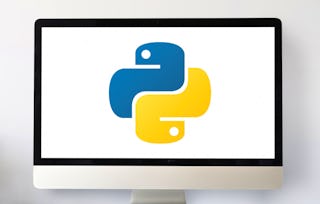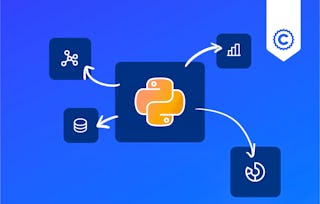Moderne Programme sind komplizierte Strukturen mit Hunderten bis Tausenden von Codezeilen, aber wie kommt man effizient von kleineren Programmen zu robusteren, komplizierten Programmen? Wie simulieren Datenwissenschaftler in ihren Programmen die Zufälligkeit von Problemen der realen Welt? Welche Techniken und bewährten Verfahren können Sie nutzen, um Software zu entwickeln, die große Datenmengen effizient verarbeiten kann? In diesem Kurs der Duke University lernen Python-Benutzer, wie man größere, multifunktionale Programme erstellt, die komplexere Aufgaben bewältigen können. Wir empfehlen nicht, dass dies der erste Python-Kurs ist, den Sie belegen, da wir eine ordentliche Menge an spezifischer Programmiersyntax behandeln werden. Wenn Sie jedoch über Grundkenntnisse der Algebra, der Python-Programmierung und der Pandas-Bibliothek verfügen, sollten Sie in der Lage sein, den Stoff dieses Kurses zu bewältigen. Im ersten Modul besprechen wir das Top-Down-Design für größere Programme, einschließlich der Programmiersyntax und der Techniken, die für das Zusammenfügen größerer Programme nützlich sind. In den folgenden Modulen gehen wir zur Diskussion von Monte-Carlo-Simulationen über und führen Sie in das Poker-Projekt ein, das größere Programm, das Sie am Ende des Kurses erstellen werden. Am Ende dieses Kurses sollten Sie in der Lage sein, ein Programmierproblem in überschaubare Teile zu zerlegen, die Grundlagen der Monte-Carlo-Methode zu erklären und kleinere Codeteile effizient in ein größeres, vollständiges Programm zu integrieren. Dies wird Sie darauf vorbereiten, den nächsten Schritt auf Ihrer Reise als Datenwissenschaftler zu machen und komplexe Programme zu erstellen, die reale Probleme kreativer simulieren können.

Entwurf größerer Python-Programme für die Datenwissenschaft

Entwurf größerer Python-Programme für die Datenwissenschaft
Dieser Kurs ist Teil von Spezialisierung für Programmierung für Python Datenwissenschaft: Von den Prinzipien zur Praxis



Dozenten: Genevieve M. Lipp
Bei enthalten
Empfohlene Erfahrung
Was Sie lernen werden
Planung der Programmdekomposition mit Hilfe des Top-Down-Designs.
Wie man einzelne Teile von Python Code in ein größeres, funktionelleres und komplexeres Programm integriert.
Kompetenzen, die Sie erwerben
- Kategorie: Einheitstest
- Kategorie: Softwareentwicklung
- Kategorie: Integrationstests
- Kategorie: Objektorientierte Programmierung (OOP)
- Kategorie: Testfall
- Kategorie: Computergestütztes Denken
- Kategorie: Python-Programmierung
- Kategorie: Pandas (Python-Paket)
- Kategorie: Programm-Entwicklung
- Kategorie: Computerprogrammierung
- Kategorie: Fehlersuche
- Kategorie: Simulationen
- Kategorie: Software Entwurf
- Kategorie: Datenmanipulation
- Kategorie: Datenverarbeitung
Wichtige Details

Zu Ihrem LinkedIn-Profil hinzufügen
1 Aufgabe
Erfahren Sie, wie Mitarbeiter führender Unternehmen gefragte Kompetenzen erwerben.

Erweitern Sie Ihre Fachkenntnisse
- Lernen Sie neue Konzepte von Branchenexperten
- Gewinnen Sie ein Grundverständnis bestimmter Themen oder Tools
- Erwerben Sie berufsrelevante Kompetenzen durch praktische Projekte
- Erwerben Sie ein Berufszertifikat zur Vorlage

In diesem Kurs gibt es 4 Module
In diesem Modul lernen Sie, wie Sie die zuvor erlernten Konzepte anwenden können, um größere Programme zu analysieren. Außerdem werden wir den Prozess der Programmzerlegung durchlaufen, um ein kompliziertes Programm in kleinere Schritte aufzuteilen, die wir leichter lösen können. Nach all diesen Teilen werden wir unsere Teile in einer Programmieraufgabe zusammenfügen, die viele der kleineren Programme, die wir während des Moduls erstellt haben, kombiniert.
Das ist alles enthalten
6 Videos3 Lektüren4 Programmieraufgaben
In diesem Modul lernen Sie die Monte-Carlo-Methode kennen, eine gängige Technik, mit der wir eine Vielzahl möglicher Ergebnisse simulieren. Außerdem stellen wir Ihnen das Pokerprojekt vor, an dem Sie im weiteren Verlauf des Kurses arbeiten werden. In diesem Modul werden wir uns darauf konzentrieren, wie wir Code schreiben können, um verschiedene mögliche Ergebnisse für eine Pokerhand zu simulieren, und welche individuellen Programmierprobleme wir lösen müssen, um eine vollständige Pokersimulation zu erstellen. Sie werden in diesem Modul einige dieser kleineren Lösungen erstellen und Feedback zu diesen einzelnen Teilen erhalten, bevor wir im nächsten Modul einige dieser Teile zusammenfügen.
Das ist alles enthalten
1 Video2 Lektüren3 Programmieraufgaben
In diesem Modul lernen Sie das Schreiben von Testfällen und Debugging in einem Python-Programm und wenden es auf Ihr Pokerprojekt an! Außerdem gehen wir zum Teil der logischen Auswertung des Pokerprojekts über, wo Sie den Code schreiben werden, mit dem Ihr Programm entscheiden kann, was ein Gewinnblatt wäre, und einige Techniken der Datenwissenschaft anwenden, um die durch Monte-Carlo-Methoden erzeugten Daten zu bereinigen. Ähnlich wie in der letzten Einheit werden Sie diese einzelnen Teile des Programms schreiben und Feedback dazu erhalten, bevor wir zur nächsten Einheit übergehen, in der wir all diese Teile zu einer vollständigen Pokerhandsimulation zusammenfügen werden.
Das ist alles enthalten
1 Lektüre1 Aufgabe3 Programmieraufgaben
In diesem Modul werden wir alle einzelnen Abschnitte des Python Codes, die wir im Laufe des Kurses geschrieben haben, in ein größeres Programm integrieren. Dies wird wahrscheinlich ein wenig Fehlersuche und Voraussicht erfordern, um alle vorherigen Teile des Codes zum Laufen zu bringen, aber Sie werden die Testfälle und Fähigkeiten, die Sie im vorherigen Modul gelernt haben, nutzen, um dies zu erreichen. Wir werden auch Objektreferenzen besprechen, eine Methode, mit der wir einen Teil des Speichers direkt referenzieren können, um die Informationen, die von den verschiedenen Teilen Ihres Programms verwendet werden, effizient zu aktualisieren. Nach all dem werden wir Ihnen Feedback zu Ihrem abschließenden Pokerprojekt geben und Sie bitten, eine kurze Reflexion über Ihr Pokerprojekt und die Erfahrung, die Sie bei der Erstellung eines größeren Programms aus seinen einzelnen Komponenten gemacht haben, zu schreiben.
Das ist alles enthalten
1 Video2 Lektüren2 Programmieraufgaben1 Diskussionsthema
Erwerben Sie ein Karrierezertifikat.
Fügen Sie dieses Zeugnis Ihrem LinkedIn-Profil, Lebenslauf oder CV hinzu. Teilen Sie sie in Social Media und in Ihrer Leistungsbeurteilung.
Mehr von Softwareentwicklung entdecken
 Status: Kostenloser Testzeitraum
Status: Kostenloser TestzeitraumDuke University
 Status: Vorschau
Status: VorschauUniversity of Leeds
 Status: Kostenloser Testzeitraum
Status: Kostenloser Testzeitraum Status: Kostenloser Testzeitraum
Status: Kostenloser Testzeitraum
Warum entscheiden sich Menschen für Coursera für ihre Karriere?

Felipe M.

Jennifer J.

Larry W.

Chaitanya A.

Neue Karrieremöglichkeiten mit Coursera Plus
Unbegrenzter Zugang zu 10,000+ Weltklasse-Kursen, praktischen Projekten und berufsqualifizierenden Zertifikatsprogrammen - alles in Ihrem Abonnement enthalten
Bringen Sie Ihre Karriere mit einem Online-Abschluss voran.
Erwerben Sie einen Abschluss von erstklassigen Universitäten – 100 % online
Schließen Sie sich mehr als 3.400 Unternehmen in aller Welt an, die sich für Coursera for Business entschieden haben.
Schulen Sie Ihre Mitarbeiter*innen, um sich in der digitalen Wirtschaft zu behaupten.
Häufig gestellte Fragen
Um Zugang zu den Kursmaterialien und Aufgaben zu erhalten und um ein Zertifikat zu erwerben, müssen Sie die Zertifikatserfahrung erwerben, wenn Sie sich für einen Kurs anmelden. Sie können stattdessen eine kostenlose Testversion ausprobieren oder finanzielle Unterstützung beantragen. Der Kurs kann stattdessen die Option "Vollständiger Kurs, kein Zertifikat" anbieten. Mit dieser Option können Sie alle Kursmaterialien einsehen, die erforderlichen Bewertungen abgeben und eine Abschlussnote erhalten. Dies bedeutet auch, dass Sie kein Zertifikat erwerben können.
Wenn Sie sich für den Kurs einschreiben, erhalten Sie Zugang zu allen Kursen der Spezialisierung, und Sie erhalten ein Zertifikat, wenn Sie die Arbeit abgeschlossen haben. Ihr elektronisches Zertifikat wird Ihrer Seite "Leistungen" hinzugefügt - von dort aus können Sie Ihr Zertifikat ausdrucken oder Ihrem LinkedIn-Profil hinzufügen.
Ja. Für ausgewählte Lernprogramme können Sie eine finanzielle Unterstützung oder ein Stipendium beantragen, wenn Sie die Anmeldungsgebühr nicht aufbringen können. Wenn für das von Ihnen gewählte Lernprogramm eine finanzielle Unterstützung oder ein Stipendium verfügbar ist, finden Sie auf der Beschreibungsseite einen Link zur Beantragung.
Weitere Fragen
Finanzielle Unterstützung verfügbar,


